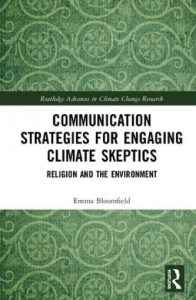By Emma Frances Bloomfield for EDRBlog.org
In our ongoing disputes and conversations about the environment and climate change, it becomes ever more pressing to uncover and explore obstacles to progress and policy enactment. In my forthcoming book, Communication Strategies for Engaging Climate Skeptics: Religion and the Environment, I specifically address the sometimes productive and sometimes detrimental role that religion and Christianity play in public attitudes on the environment. While some may view religion as an impediment to climate change beliefs, I wish to tease out these relationships in order to disrupt monolithic assumptions about both climate skeptics and religious adherents. The primary goal of the book is to create strategies for engagement to start and keep conversations going by better understanding various audiences and stakeholders in conversations and controversies over climate change.
To resolve disputes and enter environmental conversations, I propose that environmental communicators should be audience-focused. Drawing primarily from work by Kenneth Burke on identification, Richard Johannesen on dialogue, and Krista Ratcliffe on rhetorical listening, I argue that our environmental conversations must focus on engagement and understanding instead of coercion and persuasion. A key contribution of the project is my focus on seeking to understand skeptics instead of dismissing them out of hand. With a different perspective and approach to environmental conversations, I hope readers of the book can have more conversations and higher quality ones.
Get notified when new articles are posted to the EDR blog – sign up for our email list »
In the book, I propose a typology for categorizing how Christians make sense of their relationship to the environment and their attitudes toward climate change. The typology stems from attending to the worldviews, frameworks, and guiding metaphors of various audiences. Instead of categorizing people based on the strength of their denial, my typology is based on public discourse about climate change and my interviews and interactions with climate skeptics and members of the Creation Care community (Christians who support environmental advocacy based on their faith). After explaining each category, I offer brief overviews of concrete strategies for engagement.
Separators
Separators see a distinct, oppositional relationship between their interpretation of their faith and mainstream climate science conclusions. Separators operate from within a “war” framework, which drives their discourse to be aggressive and highly polarized. For example, separators may accuse climate scientists of corrupting society’s morality or seeking to destroy religion’s influence. To outline the rhetorical features of the separators, I analyzed the public discourse of the Cornwall Alliance. I propose three strategies for engaging separators in conversation: 1) ask questions and seek to learn more about the root of your dialogue partners’ skepticism; 2) accept premises and do not alter but instead embrace your dialogue partners’ driving values; and 3) make it personal and redirect existing values to align with pro-environmental policies.
Bargainers
Bargainers negotiate their understanding of mainstream climate science with competing authorities, mainly religious and economic ones. Unlike the separators, bargainers are more likely to bring up scientific data and research as valid decision-making resources. But, they oftentimes undergo a bargaining process where that information is interpreted differently in order to refute mainstream interpretations. For example, bargainers may look at the statistic that 97% of scientists ascribe to anthropogenic climate change and interpret this to mean that there are still credible experts and scientists that are unconvinced. In substituting other authorities for scientific ones, bargainers, such as the Acton Institute, operate under the framework of a revolution, where current understandings will be disrupted and replaced by further research. Again, I propose three strategies for engaging bargainers in conversation: 1) work within frames and do not seek to shift the conversation back to climate science, but instead remain within religious and economic frames; 2) join the revolution and embrace the uncertainties inherent in scientific knowledge and measure current climate skepticism against scientific criteria; and 3) employ examples and find concrete information and statistics from within bargainers’ frames that disrupt stereotypes and generalizations that bargainers may hold.
Harmonizers
Harmonizers are not climate skeptics but are Christians who actively incorporate environmental protection into the performance of their faith. They are included in the typology to show the variety of ways, both negatively and productively, that religion influences environmental attitudes. Harmonizers, such as the Evangelical Environmental Network, believe that Christians should be stewards of the environment. While there is little need to engage in conversations about the scientific reality of climate change with harmonizers, it is important to engage them on practical ways to enact their religious identity and make meaningful environmental changes. I also offer three strategies to encourage environmental behaviors in harmonizers: 1) shift frames from private to public and emphasize the importance of community and public behaviors; 2) communicate urgency and infuse the reality of climate change with immediacy; and 3) think globally and build on the harmonizers’ ecological worldview to see a variety of different forms of life and actively protecting them as implicated in Christian stewardship.
It is my hope that this book appeals to different audiences at the intersection of the environment, communication, dispute resolution, collaboration, climate science, and faith. By pairing communication and rhetorical theories with practical solutions, the book aims to not only produce knowledge but contribute to progress in environmental conversations. The most prominent contributions of the book are the interviews with people across the typology that are examples of how everyday people think about, talk about, and express themselves on these important topics. I greatly enjoyed my conversations and found that my dialogue partners respectful, open, willing to talk, and showed me that we have far more in common than we might assume. Even separators and bargainers were concerned about the environment, wanted to invest in more eco-friendly technology (largely for economic benefit), and cared about long-term impacts. What was different were the labels people were using and their perceptions of what it meant to adopt the term “environmentalist.” This finding provides evidence that reframing conversations to avoid preconceived biases may be productive ways to foster environmental conversations.

Communication Strategies for Engaging Climate Skeptics: Religion and the Environment is available now as part of Routledge’s series, Advances in Climate Change Research.

Dr. Emma Frances Bloomfield (Ph.D., University of Southern California) researches the rhetoric of science and scientific controversy, particularly around issues of climate change, human origins, and the body. She teaches classes on rhetoric and persuasion and is interested in all aspects of argumentation and pedagogy. Her recent research examines strategies for climate communicators and the role of ideologies such as neoliberalism and religion in environmental communication.
